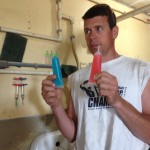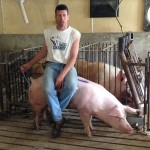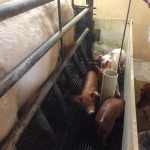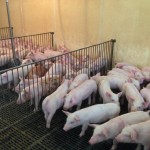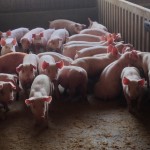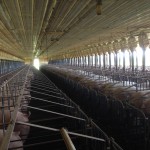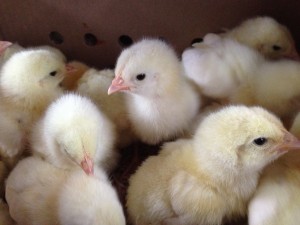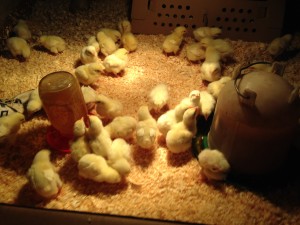What a better way to start the morning that smelling pig poop! We ended the trip, just like we started it by going to the Friest farm. Except this time, it was to see his pigs. Brent Friest is a farrow-to-finish pig farmer, meaning he breeds his own pigs, raises them to adulthood, then sells them on the market. Most pig farmers, such as Scott and his pigs on our farm, are contracted to only raise pigs up to a certain weight and age before they are sent to a different barn for finishing or to market. Because Brent does it all, we got to see the whole process, from artificial insemination to adults-for-sale or adults-for-breeding. Overall, I learned that taking care of piggies is a lot of work, but Brent seemed to have a patter. I think it is best suited for people who are very methodical. I could probably do it, granted I’ll have to borrow a few hundred thousands of dollars and find some acres of land. Brent also had a very modern, conventional style of raising pigs–otherwise known as a CAFO or concentrated animal feeding operation–and is very supportive of using gestation and farrowing crates. Although I recognize that conventional methods are advantageous towards organization, efficiency, low cost, and maximizing gain, I am still not entirely convinced that they are best in terms of animal welfare. (Sorry, Denny.) As Brent said, they are given a very balanced diet; their waste is properly disposed of and responsibly reintroduced into the life cycle as fertilizer; they are kept at a very comfortable temperature throughout the year; and they keep the animals safe. Nonetheless, even many academic and third-party studies that have studied the welfare effects of CAFOs say that the results are mixed. If we were to go on a happiness or “freedom” scale, I would say the highest degree for animals would be dogs and (most) horses, who are given much more room to move around freely, as well as (hopefully) being exposed to new environments by walking or riding.
- From semen… (they totally look like those ice pops that you eat in the summer. ew.)
- To insemination…
- …to birth…
- …to preschool…
- …to teenagers…
- …and finally to adulthood!
One of the biggest and worst offenders of misinformation of CAFOs, according to Brent, is the Humane Society of the United States (HSUS) and People for the Ethical Treat of Animals (PETA). Although I have my gripes about the Humane Society and especially PETA, the political scientist part of me did have to give them some props for effective policy work. These and other animal welfare groups have fought against CAFOs for decades, but occasionally their efforts have stalled. According to policy studies, there are two main ways to effect policy change on a large scale: change the image and/or change the arena. The first refers to the frame that a group can use to influence the public opinion. People respond to different things. For example, PETA can try to throw science into the mix. However, to an uneducated or uninterested public, it may be better to humanize the issue by asking such questions as, “Would you want to be trapped in your closet for years on end?” The second refers to where you fight your battles. For example, if you can’t win in a court, take the issue to public opinion, or if you can’t win a the federal level, take it to the states. This has also been a tactic of animal rights groups. Most do not win in court because there is no definite, all-answering report that states that CAFOs are harmful to animals. Therefore, the groups get policy ideas on the ballots, asking voters if they “want animals to be kept in cages in which they can’t turn around.” Most people would immediately say, “No, of course not!” On the other hand, farmers and those close to farmers or knowledgeable of the practice would probably give a little more thought to the question, whether they agree or disagree. However, these farmers are concentrated in such states as Iowa, North Carolina, and Minnesota. Therefore, animal rights groups put these questions on the ballots in states that contain the smallest numbers of knowledgeable or sympathetic people. Pretty sneaky, sis.
We also visited Practical Farmers of Iowa, a network of farmers who want to participate in and share research and methods relating to sustainable agriculture. One of the biggest problems in conventional agriculture and especially for horticulture and organic farmers is pesticide drift. As we’ve heard from conventional and organic farmers, alike, “there is space for every kind of farm on this Earth.” However, there is still some difficulty in making sure these farms do not harmfully interact with each other. Pesticide drift occurs when pesticide or herbicide is blown from one farm to another, such as when spraying on a windy day. This may not be as big a deal on some conventional farms where they likely use similar seed, but organic farmers risk losing an entire crop or their organic certification if certain levels of pesticides are found on their land. The most cited culprit is glyphosate, or RoundUp. Many conventional row crop farmers plant RoundUp-Ready plants, meaning they have a natural resistance to RoundUp, so the RoundUp can kill any plant except for the crop. Therefore, when this herbicide drifts, it will kill the plants of the organic farmer or even those of the conventional farmer that doesn’t use RoundUp-Ready seed. On a small scale, it has the potential to poison some relationships between farming neighbors or get parties caught up in very complex lawsuits. On a large scale, drift can pose a public health problem and some activists claim that the chance of constant drift onto a farmer’s land places pressure on that farmer to go ahead and order RoundUp-Ready seeds from biotech companies like Monsanto. Boo, corporate! Oh the joys of law and politics…
We also picked up some chick for Dalona! They were SO precious! They looked and sounded so perfectly chick-ish, that I thought they were fake. It was rather simple to get them from the feed store and putting them in their little crates. However, we had to dip their beaks in water before we let them run around. This is to show them that that was how you get water and stay hydrated. Apparently, they don’t know otherwise. Poor things.

